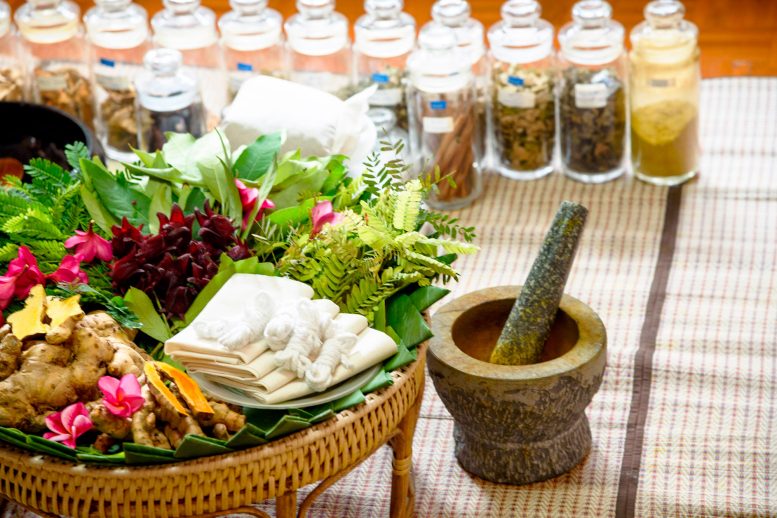
A research study reveals that Ayurvedic plants like ashwagandha and Indian pennywort can prevent depression-like symptoms in fruit flies caused by chronic stress. Chlorogenic acid, found in these plants, plays a crucial role in enhancing stress resilience.
Mainz University and the US-American BENFRA Center have jointly demonstrated the effect of botanical products used in traditional Asiatic medicine on depressive states.
Chronic exposure to stress can lead to the development of depression-like disorders that manifest as a lack of motivation – even in the fruit fly Drosophila melanogaster. As a result, the insects show less courtship behavior, are less interested in stopping to ingest sweet nutrients, and are less willing to climb a gap in the experimental setup.
Traditional medicinal plants, however, can – to some extent – alleviate some of the associated symptoms, as observed by researchers at Johannes Gutenberg University Mainz (JGU) in Germany in collaboration with the BENFRA Botanical Dietary Supplements Research Center in Portland, Oregon. The researchers have shown that two plants used in Ayurvedic medicine can improve resilience to chronic stress when used prophylactically in the flies. Despite their stressed state, they then no longer displayed behavior consistent with depression. Papers on their studies of the two plant materials have been published in Nutrients.
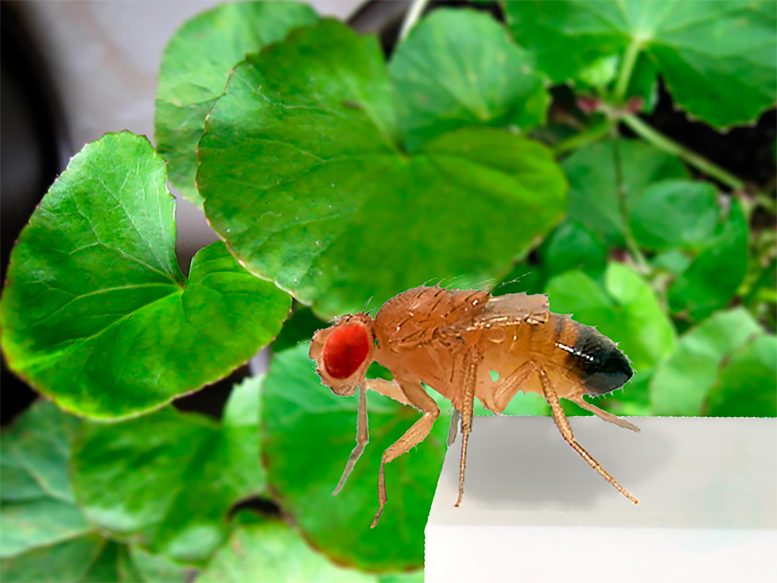
The level of motivation of the fruit fly Drosophila can be deduced on the basis of whether it attempts to climb over gaps it encounters when walking. In a depression-like state, the fruit fly is less likely to do so. In the background are leaves of Centella asiatica, the Indian pennywort. Credit: Helen Hovoet, Hans-Hermann Huber
Herbal Solutions to Stress in Traditional Medicine
The JGU research group led by Professor Roland Strauss has been using the Drosophila melanogaster model to analyze the underlying mechanisms involved in resilience to stress and the effects of stress on the nervous system. “Chronic stress can induce depression-like states also in the fruit fly, and these become apparent in changes to their behavior,” explained Strauss. In this most recent research context, his group cooperated with the BENFRA Botanical Dietary Supplements Research Center in the United States of America. The center investigates botanicals that enhance neurological and functional resilience in aging.
The Mainz-based researchers focus on testing extracts of botanicals and natural substances that are known to be used in traditional Asian medicine and are also marketed as dietary supplements. The idea is that certain plants contain above average amounts of active constituents or substances that themselves demonstrate particularly high levels of biological activity. These so-called adaptogens can help our bodies adapt to increased physical and emotional stress.
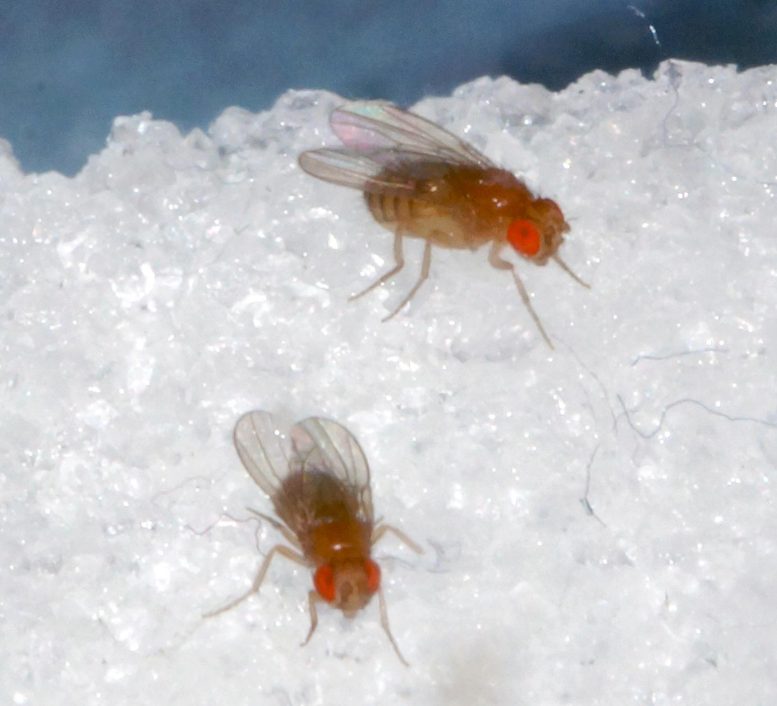
The uptake of sugar and adaptogens can alleviate and even prevent depression-like states in the fruit fly Drosophila. Credit: Tim Hermanns
“An advantage over conventional drugs could be that medicinal plants contain blends of various active botanical substances that act on different sites of the stress axis,” said Helen Holvoet, a doctoral candidate in the team of Professor Strauss and lead author of the two papers. “Because they have a synergistic effect on counteracting stress, they may cause fewer undesirable effects than if the substances themselves were administered alone in pure form.” Another potential advantage is that dietary supplements can be used as complementary medication in association with pharmacotherapies.
Research Discoveries in Ayurvedic Plants
In the joint project, Strauss’ team tested their approach for the treatment of stress using two Ayurvedic medicinal plants, namely Withania somnifera (known as ashwagandha or the sleep berry) and Centella asiatica (the Indian pennywort). The research partners were able to demonstrate that, when administered prophylactically, both plants enhanced the resilience to chronic stress so that the flies exposed to stress did not get into a depression-like state in the first place.
Identifying Key Substances in Stress Treatment
“In the case of Withania somnifera, we found that the way of preparing the root makes a difference – as aqueous extracts provided better prophylactic effects than extracts in alcohol,” explained Dr. Burkhard Poeck, who was also involved in the experiments. This surprising result does indicate how important it is to pay attention to the production methods used for dietary supplements.
The team in Mainz and their cooperation partners in Portland obtained an even more impressive result when experimenting with Centella asiatica. They were actually able to identify a specific component, chlorogenic acid, acting as a prophylactic, anti-stress substance. Chlorogenic acid is present in many botanicals, in particularly high levels in coffee beans, for example. It is also found in traditional medicinal herbs such as valerian (Valeriana officinalis) and St. John’s wort (Hypericum perforatum), the stress-relieving potential of which have long been known.
The analysis of such medicinal substances not only provides general information on their effects on neuronal stress, but it can also offer starting points for fundamental resilience research. “In this case, we were able to pinpoint a relevant target protein for chlorogenic acid in Drosophila, the protein phosphatase calcineurin,” said Professor Roland Strauss, explaining additional research results. In humans, calcineurin is present in many body organs and there are exceptionally high concentrations in the nervous system. There it interacts with numerous other proteins and mediates many signaling pathways.
References:
“Chlorogenic Acids, Acting via Calcineurin, Are the Main Compounds in Centella asiatica Extracts That Mediate Resilience to Chronic Stress in Drosophila melanogaster” by Helen Holvoet, Dani M. Long, Liping Yang, Jaewoo Choi, Luke Marney, Burkhard Poeck, Claudia S. Maier, Amala Soumyanath, Doris Kretzschmar and Roland Strauss, 15 September 2023, Nutrients.
DOI: 10.3390/nu15184016
“Withania somnifera Extracts Promote Resilience against Age-Related and Stress-Induced Behavioral Phenotypes in Drosophila melanogaster; a Possible Role of Other Compounds besides Withanolides” by Helen Holvoet, Dani M. Long, Alexander Law, Christine McClure, Jaewoo Choi, Liping Yang, Luke Marney, Burkhard Poeck, Roland Strauss, Jan F. Stevens, Claudia S. Maier, Amala Soumyanath and Doris Kretzschmar, 21 September 2022, Nutrients.
DOI: 10.3390/nu14193923



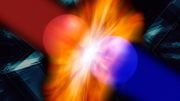



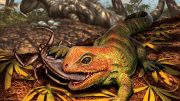
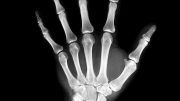
Be the first to comment on "Natural Ayurvedic Treatments Offer Relief for Depression Symptoms in Fruit Flies"